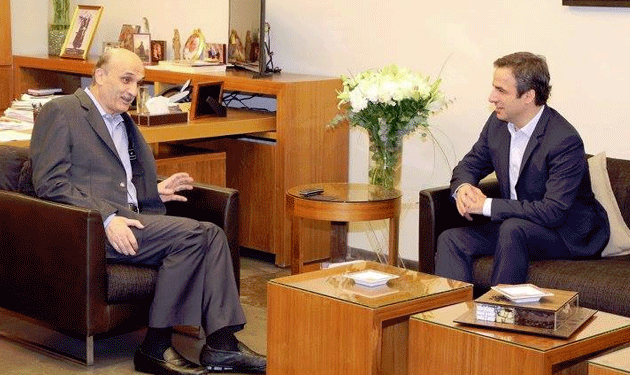The president of the ‘Independence Movement’ Michel Moawad stated that, “the Elections Law we look for can be ‘mixed’ or based on proportional voting, but the condition it should respect is that the preferential votes be restricted to the Caza and that the size of the electoral constituencies be medium to small. Anything outside of this is considered as an attempt of hegemony.”
Moawad’s words came after he met the leader of the ‘Lebanese Forces’ Samir Geagea in Meraab, after which he spoke and said:
“I met today with an ally, as part of routine meetings between us. We discussed about the current situation and in particular the Elections Law matter, around which a deep debate is taking place. The debate is not about the form of the Law, and whether if it is to be based on majority, proportionality or be mixed. These matters are merely technical as the core of the debate is that the new Elections Law ensures two things:
First, a proper representativeness of the voter that allows him to make his choice and exercise accountability according to clear criteria.
Secondly, the law should give guarantees to all the components of the country as per the Doha Pact; knowing that I am against the Doha Pact principle, as it completely different from the Taef Pact. In my opinion, the Doha Pact has created the foundations for a hidden confessional Federalism. But despite that, it should not be applied on one particular group without the others, so that no confession exerts hegemony over another, and that the national partnership doesn’t get affected as had happened during the Syrian tutelage period.”
Moawad welcomed the establishment of a Senate Council (مجلس شيوخ), “provided that it is linked to clear powers in regard of the National Pact (الميثاقية). But, I have doubts that an agreement could be reached about this council in the remaining few days.”
Moawad then spoke about the present ‘Christian Understanding’ between the ‘Tayyar’ and the ‘Lebanese Forces’: “Even though the relation is not at best at present, our duty is to strengthen and deepen this understanding. But this doesn’t mean that they become one entity. The ‘Tayyar’ and the ‘Lebanese Forces’ are two separate entities to start with. And also, of course, the ‘Christian Understanding’ cannot be limited to the two of them. But this understanding respects the diversity within the Christian body, which means that differences of opinions can show up, and when this does happen about one matter or the other, it should not be considered as a crucial and dramatic problem. This is simply a natural thing for diversity within one strategy, to reinstate a balanced national partnership.” Moawad reminded about the importance of that understanding, “which allowed the election of a strong President of the Republic, and plays an essential role to bring back the proper balance in the presently shaken national partnership.”







 العربية
العربية